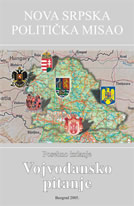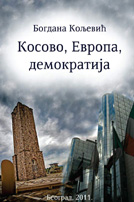| NSPM in English | |||
Hillary's Balkan “Experience” |
 |
 |
 |
| четвртак, 13. март 2008. | |
|
Senator Clinton herself has claimed that she was sent to Bosnia when it was “too dangerous” for the president to travel there himself, although she omitted the fact that the singer Sheryl Crow and the comedian Sinbad were part of the same dangerous “mission.” Clinton has also claimed credit for negotiating a deal with the Macedonian government to allow Albanian refugees to enter the country after the Kosovo war broke out, although diplomats and government officials involved in the process, such as Robert Gelbard and Ivo Daalder, don't quite remember it that way. Another somewhat dubious aspect of Senator Clinton's record in the Balkans has been her claim that she urged her husband to launch the NATO bombing campaign against Serbia in 1999; however, there is no record of her taking responsibility for such things as the bombing of the Chinese embassy in Belgrade, or the numerous attacks on targets throughout Serbia that Human Rights Watch and Amnesty International have both characterized as illegitimate attacks on civilian targets, if not outright war crimes. All of this brings to mind the problems with U.S. Balkan policy in the 1990s, the counterproductive and dysfunctional nature of the Clinton Administration's policies in the region and, ultimately, their numerous tragic consequences. The Clinton Administration came into office in January 1993, when an agreement to end the Bosnian war (then less than a year old) was on the table. The Vance-Owen Peace Plan (VOPP) was negotiated by former U.S. Secretary of State Cyrus Vance (by anyone's measure one of this country's most experienced diplomats and most honorable public servants) and his British colleague, Lord David Owen. Upon taking office, however, many members of the Clinton Administration immediately began criticizing the VOPP for allegedly “rewarding aggression” and for not providing suitable guarantees for Bosnia 's survival. The reality was quite different; in fact, the Clinton Administration's own agreement ending the Bosnian war some two and a half years later, the Dayton Peace Accords of November 1995, left Bosnia far weaker than it would have been under the VOPP. In the interim, tens of thousands of people had been killed, including the thousands of Bosnian Muslim men and boys executed by Serb forces in the Srebrenica massacres of July 1995. Hundreds of thousand of others were driven from their homes. As Owen notes, It is rare for history to show within a few years the folly of government's decisions, but by August 1995 it was painfully apparent how damaging the US decision to ditch the VOPP in May 1993 had been. The Bosnian Muslims had now been ethnically cleansed from Zepa and Srebrenica and the Croatian Serbs from the Krajina. There was no longer any talk, or hope, of reversing ethnic cleansing.Former NATO deputy commander Charles G. Boyd took a similar view, noting that the contradictory nature of U.S. policy in the Balkans actually prolonged the war in Bosnia rather than ending it. Current Swedish foreign minister Carl Bildt, one of Europe's most experienced Balkan hands, likewise argued that confusion in Washington significantly hurt the search for peace in Bosnia . Unfortunately, by the time the United States changed course and agreed to compromises in Bosnia already accepted by the Europeans and Russia , Srebrenica had already happened. Such a dysfunctional and counterproductive Balkan policy was again in evidence in the mismanagement of the Kosovo war in 1999. The Clinton Administration went into the war thinking it would be over in a matter of days. On the first day of the bombing campaign (March 24) Madeleine Albright said "I don't see this as a long-term operation." Just eleven days later, however, Albright would say "We never expected this to be over quickly." Moreover, far from preventing the mass expulsion of tens of thousands of Albanians from Kosovo, the NATO bombing campaign in many ways provoked it; as Balkan historian Misha Glenny has noted, "Instead of preventing a humanitarian catastrophe, NATO's decision [to bomb Serbia] contributed to a flood of biblical proportions." And as the war dragged on, the Clinton team appeared increasingly disengaged from reality; Clinton 's appointment as NATO Supreme Commander, Wesley Clark, ordered his British subordinate General Sir Michael Jackson to confront the Russians at Pristina airport. Jackson calmly refused a direct order from his immediate superior in the chain of command, telling Clark “I'm not going to start WWIII.” ( Clark was essentially fired from his job some three months later.) And, of course, the Clinton Administration did nothing to prevent the reverse forced expulsions of tens of thousands of Serbs, Roma and other ethnic minorities from Kosovo after NATO and the Kosovo Liberation Army moved in. In both the U.S. involvement in the Balkans and the subsequent tragedy in Iraq , the basic process by which so much of American foreign policy is formulated is evident: interest groups and ethnic lobbies, often led by Ahmad Chalabi–type charlatans, forge alliances with ideologues in government, be they neocons or liberal interventionists. These are then joined by journalists eager for sensational headlines and “sympathetic” (but by no means objective, balanced, well-informed or independent) academics who lend their “scholarly” support to their own preferred policy. And just as often, individuals who know the true costs of war and who have put their lives on the line for their country, such as Colin Powell, Eric Shinseki or William Fallon, get marginalized or forced out of office for questioning whether such political and military adventurism is worth American blood and treasure. If Hillary Clinton claims U.S. Balkan policy in the 1990s as a positive line on her CV, it does not bode well for U.S. foreign policy in a potential second Clinton administration. Both the Balkans and Iraq show that many aspects of the way in which U.S. foreign policy is formulated are clearly broken. Whether a President Obama or a President McCain would have the courage, intelligence and strength to fix them remains to be seen. But it is hard to imagine that a second President Clinton would. Gordon N. Bardos is assistant director of the Harriman Institute at Columbia University 's School of International and Public Affairs. 13.03.2008 The National Interest |
Од истог аутора
Остали чланци у рубрици
- Playing With Fire in Ukraine
- Kosovo as a res extra commercium and the alchemy of colonization
- The Balkans XX years after NATO aggression: the case of the Republic of Srpska – past, present and future
- Из архиве - Remarks Before the Foreign Affairs Committee of the European Parliament
- Dysfunction in the Balkans - Can the Post-Yugoslav Settlement Survive?
- Serbia’s latest would-be savior is a modernizer, a strongman - or both
- Why the Ukraine Crisis Is the West’s Fault
- The Ghosts of World War I Circle over Ukraine
- Nato's action plan in Ukraine is right out of Dr Strangelove
- Why Yanukovych Said No to Europe

.jpg)








 Hillary Clinton's claim to be the most qualified Democrat to run for president is largely based on her self-proclaimed foreign-policy “experience.” Much of this experience would logically come from her days in the White House when events in the Balkans were the focus of so much U.S. attention. As her husband said in January 1993, Bosnia was “the most frustrating and complex foreign policy issue in the world” that he had to deal with at the time.
Hillary Clinton's claim to be the most qualified Democrat to run for president is largely based on her self-proclaimed foreign-policy “experience.” Much of this experience would logically come from her days in the White House when events in the Balkans were the focus of so much U.S. attention. As her husband said in January 1993, Bosnia was “the most frustrating and complex foreign policy issue in the world” that he had to deal with at the time. 











